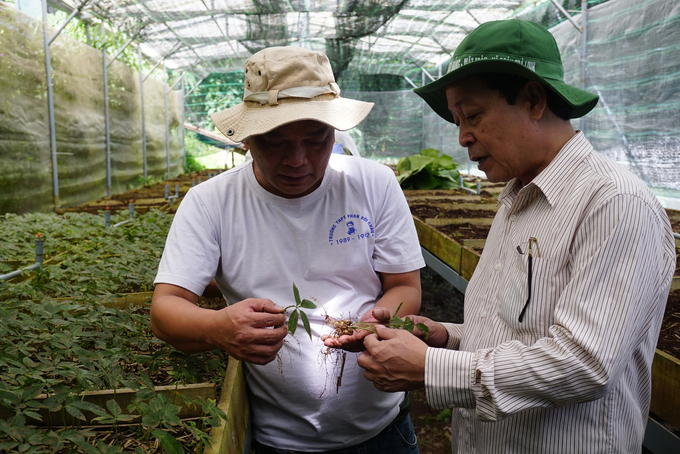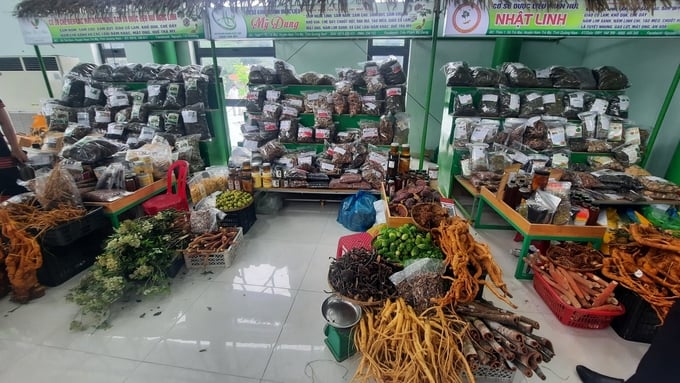December 6, 2025 | 01:55 GMT +7
December 6, 2025 | 01:55 GMT +7
Hotline: 0913.378.918
December 6, 2025 | 01:55 GMT +7
Hotline: 0913.378.918

Quang Nam province has many precious medicinal plants, including Ngoc Linh ginseng, considered a "national treasure" of Vietnam. Photo: L.K.
Quang Nam's striped terrain provides highly favorable natural conditions for the growth and development of numerous valuable medicinal plants. The province, which is located in coastal, lowland, and mountainous regions, is home to over 830 species, 593 genera, and 190 families of medicinal plants, as per the Institute of Medicinal Materials' assessments (under the Ministry of Health). The most notable medicinal plants are Ngoc Linh ginseng, Schisandra, Morinda officinalis, Codonopsis, Gynostemma pentaphyllum, Amomum, Drynaria, and Illicium.
In recent years, Quang Nam has taken a proactive approach to the cultivation of medicinal plants, recognizing it as a critical strategy for economic development in mountainous and ethnic minority regions. This method has resulted in favorable results, enabling numerous households to escape destitution and even accumulate wealth.
However, the complete potential of medicinal plants in Quang Nam has not yet been realized, as the majority of harvested products are sold in their raw state. Their minimal processing results in straightforward products such as infused alcohol or tea. The primary factor is the province's absence of modern production lines and large-scale factories for advanced processing.
Mr. Tran Duy Dung, Chairman of the Nam Tra My District People's Committee, stated that the diversity of processed products from local medicinal plants, including Codonopsis and Ngoc Linh ginseng, remains restricted. Farmers frequently encounter unstable prices during harvest seasons due to an oversupply. The financial capacity to purchase all the raw materials is lacking in the extant processing enterprises in the region, which are small- to medium-sized.

Products from medicinal plants in Quang Nam province are currently only at the initial processing level, not yet fully promoting their value. Photo: L.K.
Quang Nam currently has nearly 90,000 hectares of raw material areas for medicinal herb development, with an additional 50,000 hectares available in neighboring provinces, according to statistics. Despite this, the province's capacity to establish a medicinal herb industry nevertheless remains restricted. The policies that bolster this sector are inadequate, and the ability to attract investments, establish factories, and establish industrial zones for medicinal botanicals remains deficient. Additionally, there is a scarcity of human resources available to conduct research and develop medicinal flora.
Mr. Ho Quang Buu, Vice Chairman of the Quang Nam Provincial People's Committee, disclosed that the province has initiated the development of a proposal to establish a Medicinal Herb Industry Center, with Ngọc Linh ginseng serving as the primary commodity. The objective of this initiative is to establish robust policies and resources that will enable the raw material areas to capitalize on their potential and attract significant investment.
Prime Minister Pham Minh Chinh previously approved the policy and directed the Ministry of Health to work with pertinent ministries, sectors, and localities to create a proposal for the Medicinal Herb Industry Center in Quang Nam during a working session with the province. The province will implement the initiative, to expand the raw material areas to the South Central Coast and Central Highlands regions.
“The Quang Nam Provincial People's Committee has finalized the proposal, which has been subject to feedback from pertinent ministries, sectors, and localities. It is currently awaiting government approval. We aspire for the Medicinal Herb Industry Center in Quang Nam to reach its maximum potential and establish itself in the regional market soon. Buu stated that this project is under the provincial master plan, which was endorsed by the Prime Minister and includes the objective of establishing a national medicinal herb processing center, and it contributes to the national strategy for the pharmaceutical industry.
Translated by Linh Linh

(VAN) As of 2025, the ASEAN region has a total of 69 ASEAN Heritage Parks recognized across its 10 member states. Among them, Viet Nam contributes 15 ASEAN Heritage Parks.

(VAN) Yok Don National Park has high biodiversity with numerous endemic plant and animal species, and it is also the only dipterocarp forest ecosystem conservation area in Viet Nam.

(VAN) Viet Nam and Brunei signed two important MOUs on fisheries and IUU, expanding cooperation in agriculture, the environment, and Halal exports, aiming to substantively implement joint projects.

(VAN) The Viet Nam Coconut Association worked with the International Finance Corporation (IFC) and businesses to promote the supply chain, enhance competitiveness, and develop the coconut industry sustainably.
![Hue aims for Net Zero: [2] Pioneering low-emission tourism](https://t.ex-cdn.com/nongnghiepmoitruong.vn/608w/files/huytd/2025/12/04/0633-dulichzero-4-095634_236-161125.jpg)
(VAN) The ancient capital of Hue has developed Net Zero tourism products and models, aiming to reduce carbon emissions and pioneer the establishment of Viet Nam's green tourism destination.

(VAN) C.P. Viet Nam has announced the successful completion of its goal to plant 1.5 million trees during the 2021-2025 period, a key milestone within company's long-term ESG strategy and its roadmap for emission reduction.

(VAN) This is an initiative of MAE aimed at creating a unified coordination mechanism to implement agricultural cooperation programs with developing countries.